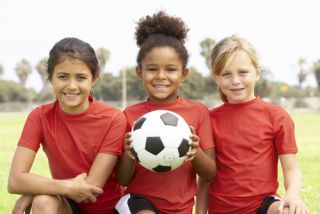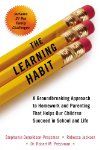
Education
Effort Based Praise: A Winning Prosocial Intervention
Lessons from The Learning Habit
Posted September 10, 2014

Many of us are afraid of failing--kids are especially prone to fearing failure and looking stupid. Because of this, trying new things can be a huge problem for children. We become concerned when fear of failure stops our children from moving toward their personal goals and dreams. Thanks to research from The Learning Habit, parents and teachers have a proven way to help children gain confidence in academic and social situations. It’s called effort-based praise.
Hannah’s was one of the many children’s stories we heard when doing research for The Learning Habit. Her story illustrates the almost magical power of effort-based praise, and the difference one coach’s prosocial approach can make in a child’s life.
Hannah and the Scary Rule
Hannah, a 10 year old fifth grader, and her parents moved right before the start of school. Hannah landed in a new state, new town, and a new school. Somewhat shy and “bookish,” she was very nervous about being “the new kid.” Because she really wanted to make friends, she made up her mind that she would go into school with a positive attitude and not let her shyness get in her way. She boarded the bus for her first day of school, trying as hard as she could to put on a happy face.
When she came home from school, however, she was in a panic. She told her parents that all students were required to play a sport--no exceptions. Hannah was definitely not “athletically inclined.” Her mother had told her daughters, “We’re thinkers, not runners,” and none of the girls played sports. Hannah thought of herself as totally uncoordinated--her feet got tangled in the jump rope; she had never even been able to master a two-wheeler. “Now everyone will see what a loser I am,” she lamented, in tears.
Hannah ultimately choose soccer; it seemed somewhat less daunting than the other choices. Then she found out that the soccer coach was the high school boys’ physical education teacher. When the first soccer meeting was held one week later, she went in a state of anxiety bordering on panic. She got quite a surprise when the coach spoke.
He told the girls, “Some of you are experienced players, and some of you may never have seen a soccer ball. I don’t care. All I ask is that you try your best; I’m not asking for winners. I am demanding that you keep working, as a member of this team, to develop your skills—I guarantee that you will all get better. You will surprise yourselves. You can complain, you can say it’s hard, that the drills are stupid--you can say I’m stupid! But there are two things you must never say: ‘I quit’ and ‘I can’t.’”
At the first practice on Monday, Hannah was standing on the field, clueless about what she was supposed to be doing, when the assistant coach yelled, “Hannah--I can see that you’re thinking about what you should do. Good attitude!” Hannah was shocked.
Two days later, she ran for a ball, tried to kick it, and missed it entirely. The coach patted her shoulder, saying, “Good girl; I like your initiative. Keep it up.”
That Friday, Hannah decided to go for a ball, ran hard, gave it a kick, slipped, and fell on her butt. She was mortified. The coach shouted, “See that, girls? That’s the kind of effort we’re looking for!” Hannah was laughing as two of her teammates helped her up.
Saturday morning, Hannah surprised her parents when she asked her father if he could take her to buy a soccer ball. As her mom was making supper that night, she looked out the window and saw Hannah, running around the back yard, kicking her new soccer ball.
The next week, Hannah asked her mother if a couple of teammates could come over after school and practice, since there was no scheduled soccer practice that day.
By the end of the season, Hannah was not a star soccer player; her team didn’t win the regionals. However, what Hannah gained was far more valuable than a trophy. She gained a sense of pride. She learned that she could make friends, be part of a team, attempt new things without fear of making a fool of herself, and be valued for her effort. That’s what a great teacher can do. That’s magical!

LEARN MORE: The Learning Habit is packed with hundreds of case studies and information from nearly 50,000 parents who participated in the groundbreaking research study. Order your copy today!
SIGN UP today to gain instant access to the dashboard on the Learning Habit Study (the largest data set in history on family routines and habits.)

